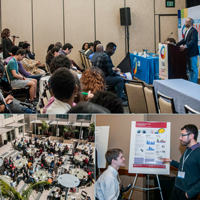Participants in the CRA Grad Cohort for Underrepresented Minorities + Persons with Disabilities Report Stronger Professional Skills After Attending the Workshop

This spring, CRA launched a new program called Grad Cohort for Underrepresented Minorities + Persons with Disabilities (Grad Cohort URMD), which was modeled after the CRA-W Grad Cohort for Women workshop that has been running since 2004. Just like CRA-W Grad Cohort for Women, Grad Cohort URMD is a two-day workshop for underrepresented students in graduate degree programs in computing. The goals of Grad Cohort URMD include providing strong mentorship, facilitating students’ professional networks, fostering a sense of belonging, and bolstering professional skills necessary for a successful progression into computing research careers.
CERP evaluated the inaugural Grad Cohort URMD event. CERP found that compared to before the workshop, participants reported stronger professional skills after attending Grad Cohort URMD. This finding makes sense, as Grad Cohort URMD hosts sessions on balancing priorities and managing time, as well as strategies for navigating the job search for students at both the Master’s and PhD levels. Finally, Grad Cohort URMD also provides one-on-one mentoring sessions for career advisement and CV/Resume review.
Grad Cohort URMD will begin accepting applications in October 2018 for the next workshop to be held in March 2019. For more details about CERP’s findings from their evaluation of the 2018 Grad Cohort URMD workshop, visit CERP’s website.
Notes:
CERP evaluated Grad Cohort URMD using a pretest/posttest methodology, wherein participants completed a survey two-weeks before the workshop and then immediately following the workshop. In the survey, participants were asked to rate their knowledge in the following items on a scale from (1) Very poor to (5) Very strong: “preparing my curriculum vitae,” “resume writing,” “job search strategies,” “negotiating job offers,” “effective teaching,” “obtaining funding for research,” “time management strategies,” and “how to balance my career and social life.”
Results were generated using a paired samples t-test on each professional skill, treating Time as a within-subjects variable. Statistical significance was determined using p ≤ .05. Time 2 means are compared against Time 1 means. In the figure, (*) signifies statistical significance at the p ≤ .05 level and (**) signifies statistical significance at the p ≤ .01 level.
 This analysis is brought to you by the CRA’s Center for Evaluating the Research Pipeline (CERP). CERP provides social science research and comparative evaluation for the computing community. Subscribe to the CERP newsletter here.
This analysis is brought to you by the CRA’s Center for Evaluating the Research Pipeline (CERP). CERP provides social science research and comparative evaluation for the computing community. Subscribe to the CERP newsletter here.
This material is based upon work supported by the National Science Foundation under grant CNS-1246649. Any opinions, findings, and conclusions or recommendations expressed in this material are those of the author(s) and do not necessarily reflect the views of the National Science Foundation.








